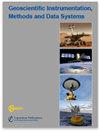Research on online data transmission technology in a marine controlled-source electromagnetic transmitter
IF 2.3
4区 地球科学
Q3 GEOSCIENCES, MULTIDISCIPLINARY
Geoscientific Instrumentation Methods and Data Systems
Pub Date : 2023-09-04
DOI:10.5194/gi-12-187-2023
引用次数: 0
Abstract
Abstract. This paper proposes a method for acquiring complete status information and data from the marine controlled-source electromagnetic (MCSEM) transmitter during offshore experiments. The subordinate machine system is constructed on the STM32 platform and incorporates a real-time operating system. It utilizes the internet of things (IoT) concept to interconnect various modules within the transmitter, enabling intelligent control and management. At the same time, data are uploaded to the control room on the deck through photoelectric composite cables, and the host computer's software, designed with Python language, will process and store all the data. This allows workers on the deck to control the subordinate computer and obtain high-precision, complete data in real time. The joint tests between the subordinate and host computers have demonstrated the stability and reliability of the online transmitter system, which provides significant convenience for offshore exploration.船用可控源电磁发射机在线数据传输技术研究
摘要提出了一种在海上实验中从海洋可控源电磁发射机获取完整状态信息和数据的方法。下级机系统构建在STM32平台上,并集成了实时操作系统。它利用物联网(IoT)概念将发射机内的各个模块互连起来,实现智能控制和管理。同时通过光电复合电缆将数据上传到甲板上的控制室,上位机用Python语言设计的软件对所有数据进行处理和存储。这使得甲板上的工作人员可以控制下级计算机并实时获得高精度、完整的数据。通过上位机与下位机的联合测试,验证了在线传输系统的稳定性和可靠性,为海上勘探提供了极大的便利。
本文章由计算机程序翻译,如有差异,请以英文原文为准。
求助全文
约1分钟内获得全文
求助全文
来源期刊

Geoscientific Instrumentation Methods and Data Systems
GEOSCIENCES, MULTIDISCIPLINARYMETEOROLOGY-METEOROLOGY & ATMOSPHERIC SCIENCES
CiteScore
3.70
自引率
0.00%
发文量
23
审稿时长
37 weeks
期刊介绍:
Geoscientific Instrumentation, Methods and Data Systems (GI) is an open-access interdisciplinary electronic journal for swift publication of original articles and short communications in the area of geoscientific instruments. It covers three main areas: (i) atmospheric and geospace sciences, (ii) earth science, and (iii) ocean science. A unique feature of the journal is the emphasis on synergy between science and technology that facilitates advances in GI. These advances include but are not limited to the following:
concepts, design, and description of instrumentation and data systems;
retrieval techniques of scientific products from measurements;
calibration and data quality assessment;
uncertainty in measurements;
newly developed and planned research platforms and community instrumentation capabilities;
major national and international field campaigns and observational research programs;
new observational strategies to address societal needs in areas such as monitoring climate change and preventing natural disasters;
networking of instruments for enhancing high temporal and spatial resolution of observations.
GI has an innovative two-stage publication process involving the scientific discussion forum Geoscientific Instrumentation, Methods and Data Systems Discussions (GID), which has been designed to do the following:
foster scientific discussion;
maximize the effectiveness and transparency of scientific quality assurance;
enable rapid publication;
make scientific publications freely accessible.
 求助内容:
求助内容: 应助结果提醒方式:
应助结果提醒方式:


